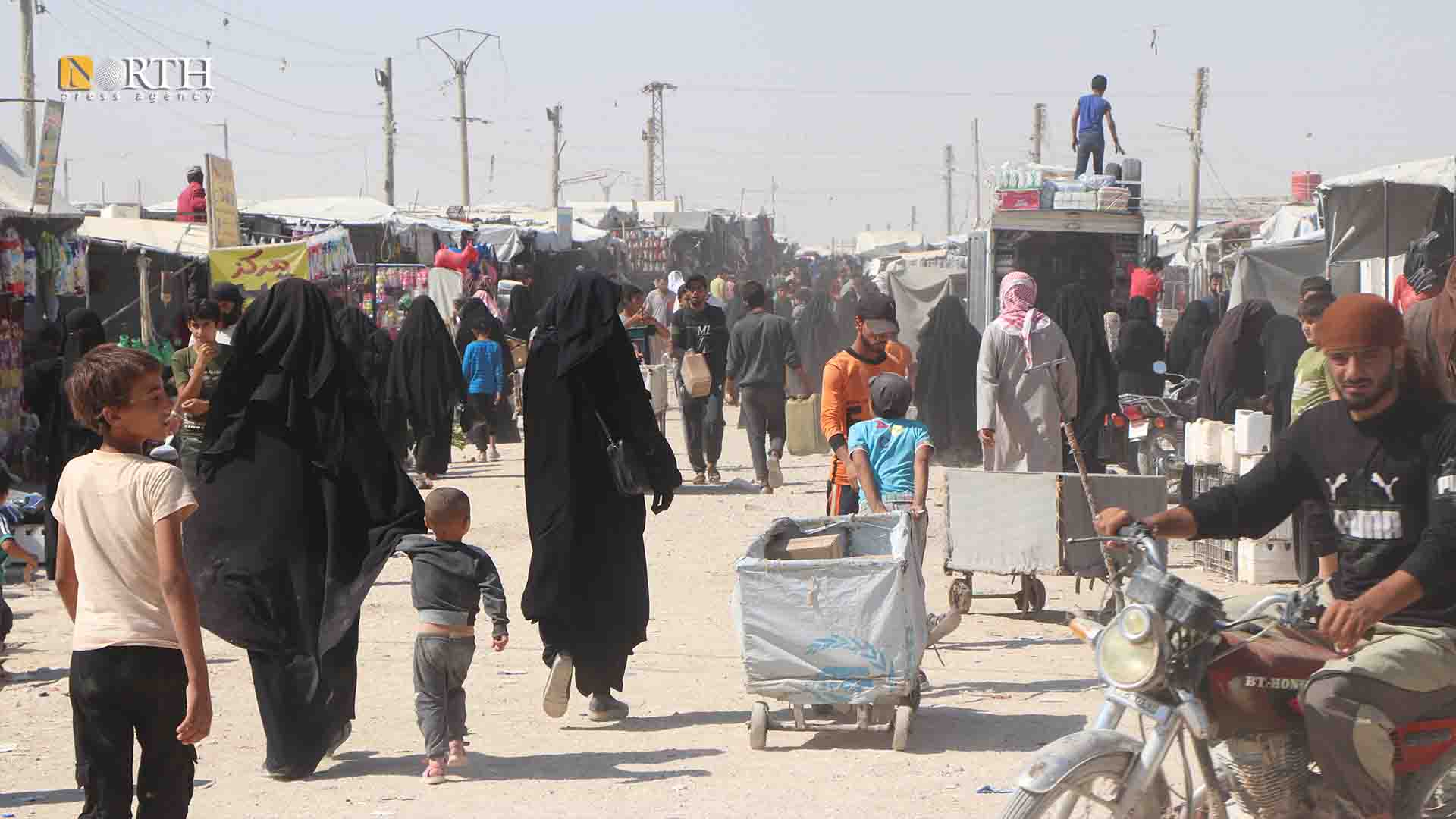HAWL, Syria (North Press) – IDPs and refugees of Hawl Camp, eastern Syria’s Hasakah have worries after a series of bloody events that the camp witnessed with the advent of the new year, while the vacuum in local councils creates obstacles to relief and humanitarian efforts.
The first week of the new year witnessed the highest the highest weekly toll of assassinations, including Syrian IDPs and Iraqi refugees, in the camp.
On Saturday, the Internal Security Forces [Asayish] found the body of an Iraqi refugee who was beheaded by unknown persons in Hawl camp,
Refugees Office chair Sheikhmous Ahmed, revealed in a previous interview with North Press that the number of foreign ISIS families in the camp is 2,625, with a total of 8,965 persons.
While the number of families who currently live in Hawl Camp has reached 6,155 Syrian families, with a total of 22,231 persons, and 8,284 Iraqi families with a total of 30,706 persons, according to
Horror reigns
The displaced in the camp are afraid to speak to any media outlet for fear that they will be killed and that they will be the next target of ISIS cells if they denounce what is happening in the camp.
In a sub-street far from the gatherings and near the office of the Iraqi Council, which is closed after the killing of the head of Iraqi Council in November 2020, an Iraqi refugee from Ba’aj region agreed to speak but preferred not to mention his name, for security reasons.
He said that the situation inside the camp is a more stable compared to the past days, which witnessed cases of killing. “A few days ago, we were not able to leave the tent due to the successive killings,” the Iraqi refugee added.
During the past week, unidentified persons killed two of the cousins of the Iraqi refugee (a young man and a girl) with sharp objects, although he denied that his cousins had any connection with any party.
On January 9, unknown people fired at the Asayish causing the death of an Asayish member and wounding other after a raid on the Third Section searching for those who killed the head of the Syrian council Hamad Saleh Hadid (Abu Ahmad Shamari).
Hawl Camp consists of nine sectors, eight of which are for Iraqi refugees and Syrian IDPs, while the other is for ISIS families.
A source from the Asayish said that a terrorist detonated a hand grenade and was killed as a result, as light weapons clashes erupted between the Asayish and unknown persons suspected of belonging to ISIS.
On how the weapons entered the camp, the security source said that investigations are underway, but nothing has been determined so far.
“Shooting, using a silencer, and using sharp tools to kill are the most used methods,” Hamrin al-Hassan, an administrator in the camp, told North Press earlier this month.
Al-Hassan did not hide her fears that the bloody situation would worsen if the rest of the camp’s residents kept silent regarding the identity of the perpetrators.
In the wake of these events, the Asayish tightened its security procedures on all exits and entrances to the camp, through careful inspections that affected even vehicle engines.
Demands for Repatriation
Near the Kurdish Red Crescent medical point, two veiled Iraqi refugees refused to reveal their identities and only stated that they are from the Iraqi province of Salah al-Din, and wanted to ask the Iraqi government to bring them home.
The two women, who have lived in the first sector of the camp for five years, say that the Iraqi government is ignoring them.
One of them referred to what is happening inside the camp: “Our conditions are good, thank God, everything is available to us, but fear is the only obsession.”
The other woman added, “There are killings everywhere in the camp, and we do not know what our fate is. We do not want anything but to get out of the camp. What is our government waiting for?”
Officials of the Autonomous Administration and the Iraqi Refugee Council in Hawl Camp blame the Iraqi government for its delay in the issue of the return of refugees to their homes.
Administrative Vacuum
With the assassination of the heads of the Syrian and Iraqi councils, in conjunction with the series of crimes that were committed, none of the camp residents dared to fill the administrative void in the councils for fear of being killed.
The vacuum increased the burden of camp management and slowed down the paperwork of relief and humanitarian organizations and societies in providing aid.
Most of the paper files were transferred to the camp administration office in light of the increase in complaints of the decline in aid provision to camp residents.
Jaber Mustafa, Camp Relations Officer, told North Press that the recent crimes that have been committed have caused slow and anxious workers and negatively affected the workflow.
He pointed out that the councils and communes had a great role, as they were working on the ground through direct contact with the displaced and refugees to assist organizations in the distribution, projects, awareness, and routine work.
He added, “We are currently developing an alternative plan to fill the current administrative vacuum, because of the great difficulties we are facing.”

